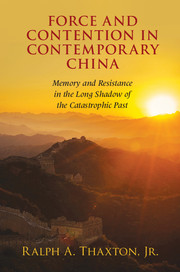 Force and Contention in Contemporary China
Force and Contention in Contemporary China Book contents
- Frontmatter
- Dedication
- Contents
- List of Illustrations
- Acknowledgments
- Cast of Characters for Da Fo Village and Several Other Villages in the Hebei-Shandong-Henan Border Area, 1945–2013
- Maps
- Introduction
- 1 The Violent Dawn of Reform
- 2 Contemporary Tax Resistance and the Memory of the Great Leap
- 3 Birth Planning and Popular Resistance
- 4 Rural Schools and the “Best Citizens of the State”: The Struggle for Knowledge and Empowerment in the Aftermath of the Great Leap
- 5 Official Corruption and Popular Contention in the Reform Era
- 6 The Rise of the Electricity Tigers: Monopoly, Corruption, and Memory
- 7 The Defeat of the Democratic Experiment and Its Consequences
- 8 Contentious Petitioners and the Revival of Mao-Era Repression
- 9 Migration and Contention in the Construction Sector
- 10 The Rise of the Martial Artists and the Two Faces of Mafia
- Conclusion: Big Questions and Small Answers from Da Fo
- Bibliography
- Index
- Miscellaneous Endmatter
5 - Official Corruption and Popular Contention in the Reform Era
Published online by Cambridge University Press: 05 August 2016
- Frontmatter
- Dedication
- Contents
- List of Illustrations
- Acknowledgments
- Cast of Characters for Da Fo Village and Several Other Villages in the Hebei-Shandong-Henan Border Area, 1945–2013
- Maps
- Introduction
- 1 The Violent Dawn of Reform
- 2 Contemporary Tax Resistance and the Memory of the Great Leap
- 3 Birth Planning and Popular Resistance
- 4 Rural Schools and the “Best Citizens of the State”: The Struggle for Knowledge and Empowerment in the Aftermath of the Great Leap
- 5 Official Corruption and Popular Contention in the Reform Era
- 6 The Rise of the Electricity Tigers: Monopoly, Corruption, and Memory
- 7 The Defeat of the Democratic Experiment and Its Consequences
- 8 Contentious Petitioners and the Revival of Mao-Era Repression
- 9 Migration and Contention in the Construction Sector
- 10 The Rise of the Martial Artists and the Two Faces of Mafia
- Conclusion: Big Questions and Small Answers from Da Fo
- Bibliography
- Index
- Miscellaneous Endmatter
Summary
At the turn of the twenty-first century, the central problem facing Da Fo villagers was political corruption. Hu Jintao, the chairman of the Chinese Communist Party (CCP), visited Xibaipo village in Hebei province in December 2002, where he gave a passionate speech about the critical urgency of fighting corruption in China. According to one report, Hu subsequently stated in a special emergency meeting of the Politburo: “It is not a few local governments, but most of the local governments; it is not a few officials, but most of the officials who are corrupt and suppressing people with state power. Are they not forcing the people to rise up to overthrow the Communist Party?” In Origins of the Chinese Revolution, Lucien Bianco reminds us that corruption – not simply social misery and the destabilizing consequences of the Japanese invasion – proved fatal to the Nationalist government.
Some Da Fo farmers, including those who had supported Mao's pre-1949 insurgency, said the fate of the corrupt Communist Party would be the same as that of the Kuomintang. Worried about this possibility, and using corruption as a pretext to put his own clients in key positions, in 2013 Xi Jinping kicked off his presidency with a vow to pull out all stops in fighting official corruption. The ensuing offensive, reminiscent of Mao-era anticorruption campaigns, was orchestrated to present the supreme leader of the Communist Party as a man of the people and, according to Andrew Wedeman, to “build legitimacy.”
Building legitimacy through campaigns that did little to actually change the corrupt habits of Mao-era rule was difficult, however. Beijing's failure to institute such change is an important reason why the post-Mao period, including the reign of Deng Xiaoping, saw an explosion of popular resistance to corruption. In the Liangmen township–Da Fo village area, this resistance was charged by memories of Communist Party rule in Mao's great famine. It seems that there was nothing like the outbreak of Deng-era corruption, and resistance to it, at play locally in the initial phase of post-Stalinist USSR politics. Why the difference? For one thing, Nikita Khrushchev apparently ran a very tight ship. His party – and the KGB – relied on internal administration to regulate official corruption.
- Type
- Chapter
- Information
- Force and Contention in Contemporary ChinaMemory and Resistance in the Long Shadow of the Catastrophic Past, pp. 164 - 206Publisher: Cambridge University PressPrint publication year: 2016
